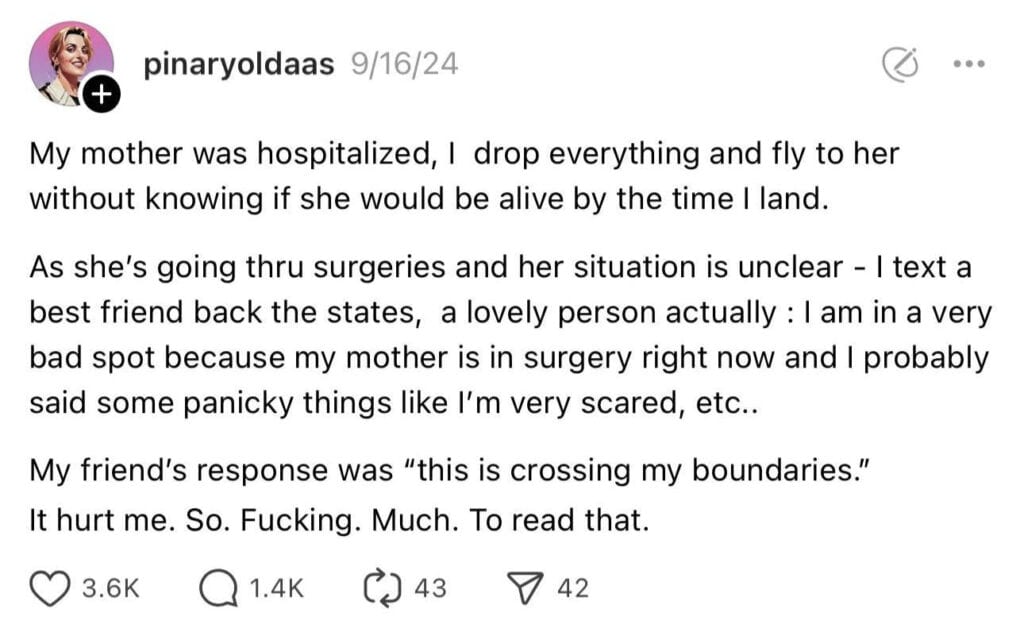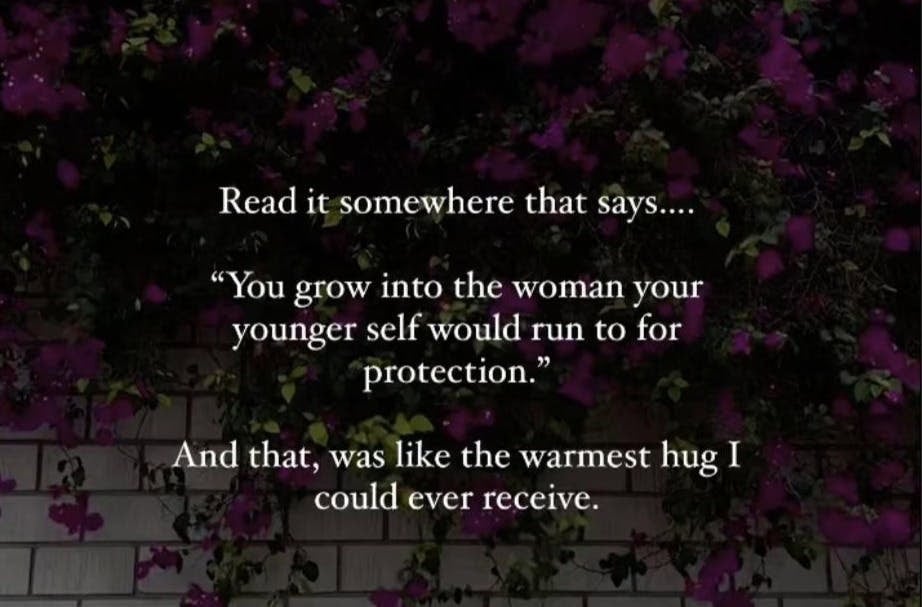
Let’s Recap The Friend Breakup:
Last week, I wrote about my experience with the Friend Breakup, which sparked a lot of conversation here, here, and here. I recounted two friend breakups: one in which I was the dumper and another in which I was the dumpee. In the case of the former, I had a face-to-face conversation with my friend, explaining to her why I felt our friendship needed a break. We then parted ways for almost a decade, after which we reunited as perhaps not “friends,” but as “friendly.”
In the case of the latter (i.e., wherein I was the dumpee), my “friend” did not give me the courtesy of telling me what I had done to be emotionally exiled from her life. She simply “ghosted” me, in today’s parlance. Many many months later, I worked up the courage to reach out to her, hoping either to reconcile or at least have a conversation about what it was that upset her so much. She politely declined to engage with me on the subject (or any other subject). We haven’t contacted each other since. To this day, I do not know what caused the complete 180 in our relationship.
Is There A Right (Or Wrong) Way To Handle A Friend Breakup?
Since going through the agony of being on the receiving end of a friend breakup, I’ve reconsidered every single friendship I haven’t sustained–by intention or otherwise. Did any of these friendships sputter because I inexplicably ghosted someone? And in those instances where I had very specific reasons for the friend breakup, was I clear and fair in the way I handled the dissolution? Implicit in this re-excavation of the not-small cemetery housing the bones of my platonic relationships is the notion that there is a “right” and “wrong” way to handle a breakup of this kind.
I’ll be clear (if I wasn’t already): I believe in due process. If I’m going to cut someone I consider to be a close friend out of my life so abruptly, as cleanly and completely as a divorce, I think that person is entitled to an opportunity to be heard. In the same way the law affords us a right to confront our accusers, we should all be allowed to “say our piece” before being permanently cast the villain (obviously, there are exceptions for abuse, criminal behavior, or other patently dangerous situations). Hence, even at the tender age of 13-years old, I met my soon-to-be ex-friend at the parking lot steps and told her, through tears, why I could no longer be her friend. I was prepared to hear her out, but she elected not to exercise her right to speak.
I’m fairly certain that the friend who dumped me believes she was well within her rights to ghost me (she was quite civil in her refusal to discuss the demise of our friendship). During my time on the “emotional hamster wheel,” I had a lot of trouble reconciling my personal beliefs on the “right way” to handle this with what I assumed was my former friend’s implementation of “boundaries.” Though I can’t be certain (since she refuses to talk to me), I believe she erected the wall between us in order to protect herself from some perceived threat or even just plain old unpleasantness that my presence in her life injected.
I generally respect a person’s right to preserve their mental health and well-being, but what about me? Were my feelings–which had been shredded so absolutely I could barely recognize myself–were my feelings irrelevant? Must empathy and kindness take a backseat to even the slightest imposition on one’s ego, a mere thumbprint on the forcefield of self-preservation?
“But I’m Just Setting My Boundaries.”
I received countless messages from kind, well-meaning people who expressed shock and disbelief at the emotional wreckage evidenced in the comments to my Instagram post by those who’d been ghosted and dumped. They second-guessed the way they handled their friend-breakups, wondering if perhaps they could have been kinder. I like to believe that maybe my friend just doesn’t know how much her behavior impacted me, how it threw me into a reckoning of self-worth I was ill-equipped to handle. Others confessed that “ghosting” was not necessarily their choice at all, but was forced on them by an abusive partner. This, of course, had never occurred to me and I am almost certain it isn’t applicable to my situation (though I don’t want to discount it as a possibility for others). And still others suggested that there was nothing wrong with ghosting a friend, if doing so was a matter of “setting healthy boundaries.”
A few weeks ago, I went on a bit of a rant about texting. One of my gripes with texting is that it has legitimized the avoidance of hard conversations. Don’t want to deal with the fallout of a breakup? Simply text them and block them. Not coincidentally, with the advent of “social media therapy,” concepts typically confined to the four walls of a session between a therapist and their patient, have been repurposed and, in some cases, weaponized to absolve people from any accountability: “I don’t want to deal with the consequences of my unkind behavior towards you, so I’ll characterize it as ‘boundary setting.'”
But consequences, here, aren’t limited to the other person’s anger, tears, or repeated appeals of innocence. As distressing as those might be to have to confront, far more uncomfortable for some is coming face-to-face with the idea that what they did isn’t particularly good. “Boundary-setting” conveniently drops a cloak over the mirror, one that might otherwise reveal that they’re not the nice, kind, empathetic, generous person they thought they were. That they’re not strong, honest, and fair. But instead, the reflection might show someone who is a little bit unkind, manipulative, selfish, and weak.
Make no mistake, friends. Empathy, compassion–those are not for the weak-willed. Ask anyone rescuing dogs, running a sanctuary for animals, sitting on the other end of a domestic abuse hotline. It takes profound courage, mettle, and discipline to extend our emotional bandwidth beyond the everyday, to drop our egos for a bit and lay ourselves bare to the slings and arrows of accountability and, yes, friendship.
Because friendship doesn’t work without accountability. It doesn’t work without mutual respect, trust, and forgiveness. It doesn’t work without work.
The post at the top of this newsletter is boundary-setting run amok, an appalling example of how therapy-speak was used to provide complete immunity from any accusation of being unkind, unempathetic, disrespectful, or even just impolite. Because the rebuttal will certainly be, “I’m entitled to protect my mental health.” And though it’s rarely said out loud, the end of that handy defense is “even if it disproportionately damages yours.”
I have much more to say on this subject, but a lot of it remains unformed. I’d like to do some more reading and will be chatting with a friend of mine (one who would never ghost me!) who is studying to be a licensed therapist before I continue to share my thoughts with all of you. In the meantime, what do you think? Has “boundary setting” gone a step too far? Are there other concepts falling under the umbrella of “therapy speak” that have spawned unintended consequences? What are the circumstances in which you think it is okay to ghost a long-time friend?
FREE E-Book: Seven Spectacular Side Dishes!
In case you missed it, I spent the last month developing, filming, writing, and putting together Seven Spectacular Sides, my new e-book for you to cook from for your next holiday party. Because, let’s face it–the best dishes on the table are almost always side dishes!!

If you’re already subscribed to my newsletter, the direct link to my e-book is in your inbox. If you’re not subscribed, click the button above to get cookin’!!
Parting Thoughts
Earlier today, I came across an Instagram Reel with the following quote:
“You grow into the woman your younger self would run to for protection.”
Like the creator above notes, this idea is comforting in a lot of ways. It suggests that our lives are pointed in the right direction by default, that our past hurts and traumas serve some meaning. They make us stronger and better people.
The truth is, I misread this quote the first time I saw it. I subconsciously inserted the phrase “Aim to grow into the woman…”
I still found it comforting. Because it illuminated a very specific purpose, one that was as concrete as all the things I grew up being afraid of. All the things I’m still afraid of. I could easily perform a comparison between the woman I’d run to for protection and the woman I am today. I was happy to discover that so much of them overlapped. Yes, younger Joanne would definitely feel safer around Lawyer Joanne. And even as I write this down, I wonder how much of this subconsciously nudged me towards a career in law. And yes, younger Joanne would feel soothed by Aunty Joanne, the woman who waves her knife around while yelling at people about self-love, confidence, heartbreak, and the ongoing fight against the ills of this world. I am protective of those I love–fiercely so–because a part of me wishes, so badly, she had someone like that in her own life.
But the comparison isn’t perfect. There are parts of me, today, that even younger Joanne might view with skepticism. I am plagued with self-doubt, still far too reliant on the opinion of others in deriving conclusions about my worth. I am too shy. Yup, I said it. I’m too shy! I shrink in crowded places, instinctively, believing in my core that I’m not good enough to physically be included in certain spaces. And when I think of younger Joanne? I want to tell her, categorically, You belong in all the spaces you will earn.
And thus, the comparison, while imperfect, remains a good one. I know, now, the gaps that must be colored in. The areas that require attention before I am truly the woman I know I can be.
Wishing you all the best,
Joanne













 English (US) ·
English (US) ·